
It has been a challenging couple of years for family businesses in the Middle East, but they have more than risen to the challenge. The talents and enthusiasm of the NextGen Members has been an important ingredient of the resilience of family businesses both before and during the pandemic.
Now, as family businesses across the region work to recover and grow, the NextGen will once again prove their worth. This survey captures the views and aspirations of the NextGen in family businesses across the Middle East. It also shows that the pandemic has united family businesses and brought generations together. This is good news as family businesses put in place a winning growth strategy for the months and years ahead.
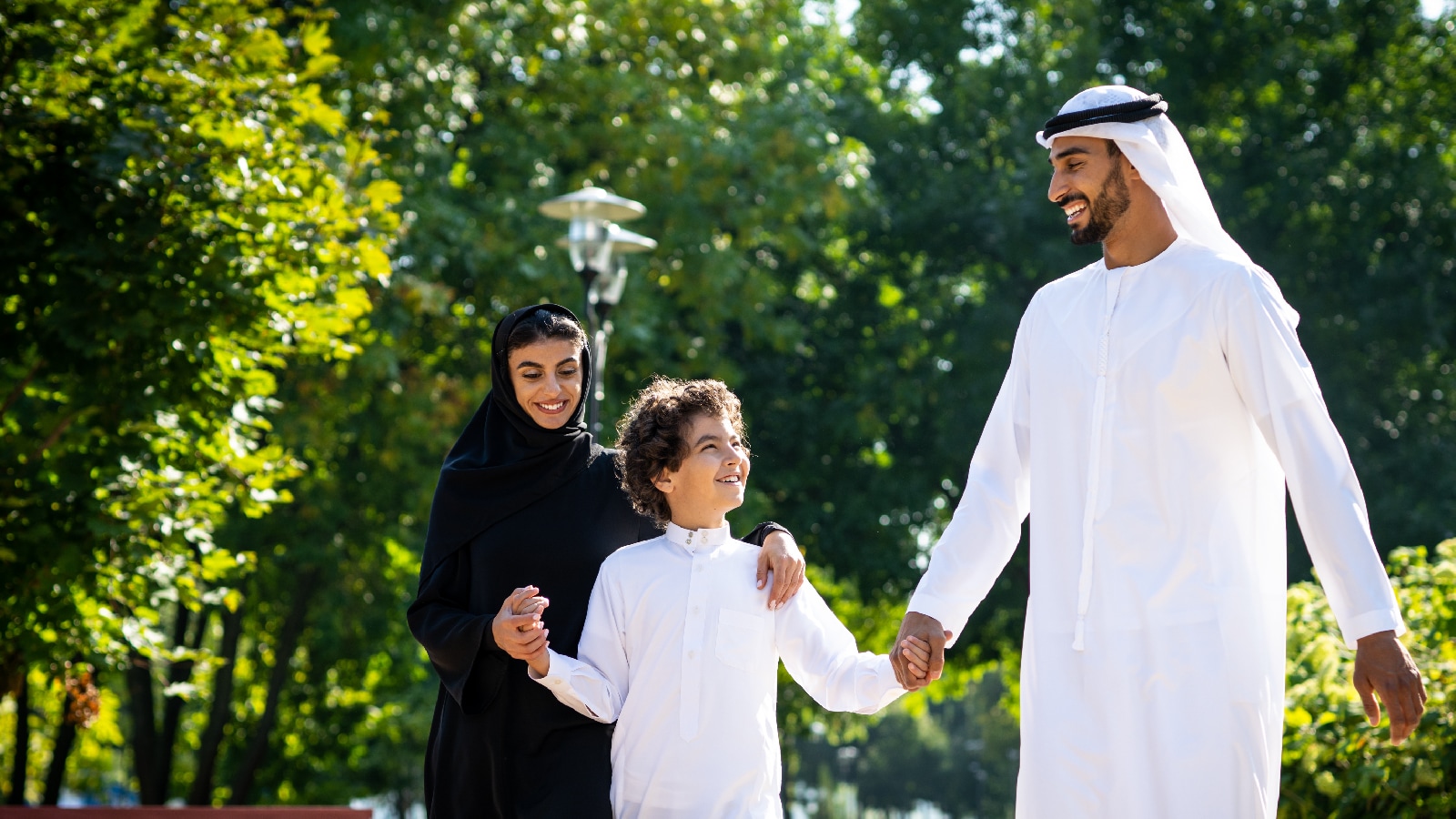
The growth imperative
While family businesses are a driving force for economies around the world, they invariably face unique challenges. Conflict among family members who own or work within the business is not unusual. And in recent years our surveys have shown a divide between the priorities of the current generation of owners and the younger generation who will one day take over – particularly around the importance of sustainability and environmental issues, and on the rate of technology adoption. In this year’s survey, for example, 31 per cent of NextGen told us that a priority for the business should be to increase the focus on sustainability and social responsibility, but only 16 percent of the current generation agreed.
The Covid-19 pandemic, though, has brought the generations together and when it comes to future success for the family business, they are united around the main post-pandemic priority: Growth. 78 percent of Middle East respondents (compared with 65 percent globally) say that growth is their top priority, in order to maintain and build on the legacy created by previous generations and to secure the family’s continued prosperity and wealth.
For most, growth is defined as higher sales and revenue, which they see as being achieved mostly through diversification into new products and markets; 56 percent of family businesses in the Middle East say that expansion into new sectors and markets is a key priority for the next few years. In our last survey in 2021, investing in new technologies and digital skills – an area that has suffered from underinvestment in the past – was also seen as critical for the near future, with three-quarters of family businesses saying that digital, innovation and technology initiatives were a top priority for the following two years. This ambition seems to have been addressed to some extent as this year only a third of family businesses name adopting new technologies as a key priority.
Family businesses in the Middle East suffered more than others from the impact of the pandemic, which hit at a time of fluctuating oil prices and stagnating economic growth in the region. According to our 2021 Family Business survey, 56 percent of Middle East family businesses expected sales to fall as a result of the pandemic, compared with 46 percent globally. And while Middle East family businesses were more cautious about a return to growth in the short term, 89 percent said they expected revenues to increase in 2022.
The fundamental question is how to achieve these growth ambitions in an environment with extreme challenges: climate change, ongoing pandemic disruption, geopolitical volatility, and technological change. Which growth strategies will achieve the best results? And what capabilities do you need, as the leaders of tomorrow, to ensure the prosperity of your family businesses?
Challenging the status quo
When we asked NextGen for their business priorities over the next two years, most focused on growth strategies such as expansion into new markets, upskilling, and the use of technology (figure 1).
These are familiar strategies – in other words, the way that things have always been done in the past in order to achieve growth. When we compare the priorities of current generation family leaders globally with those of NextGen, both largely agree on this approach. But we would argue that familiar tactics may not be enough. The world is changing, and family businesses must adapt if they are going to thrive.
The Middle East region is evolving rapidly and radical changes are already underway as countries explore new opportunities. Saudi Arabia’s Vision 2030, for example, is creating valuable opportunities, and the UAE has signed the region’s first free trade agreement with Israel. Family businesses will need to be equally open to change in rapidly evolving markets if they are to meet their growth ambitions.
Growth is a complex area for family businesses, with emotional as well as financial elements in the mix. As leaders in waiting, you will have to develop your own blueprint for success, and this means reassessing the business’s priorities. You will find yourself pushing boundaries and challenging years of established thinking. You will need new capabilities beyond digital expertise to comply with ESG requirements. And you will need to address workforce productivity – investing in skills to unlock the value of human capital and making the link between workforce wellbeing and productivity.
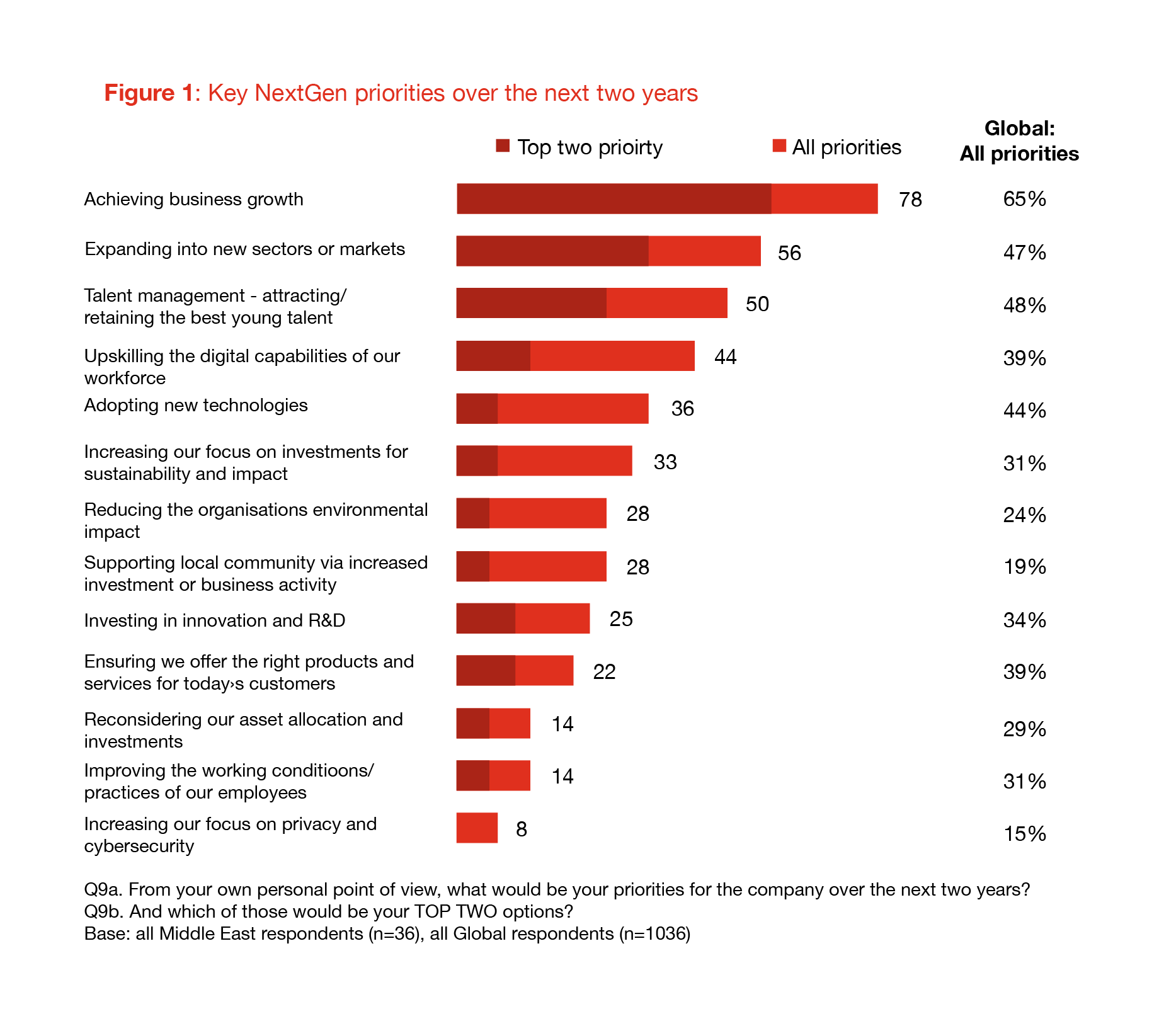
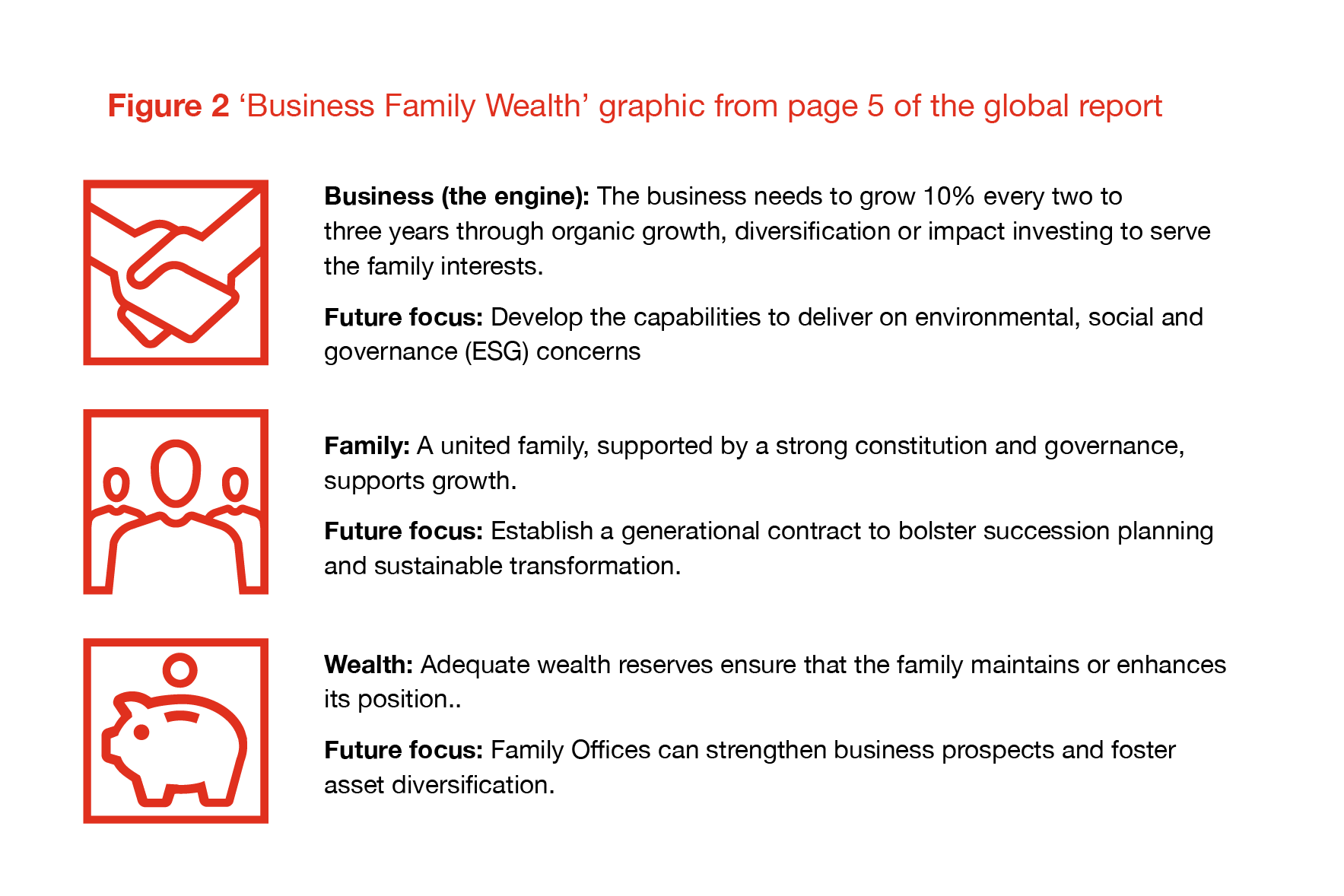
Time to act on ESG
Environmental, social and governance (ESG) standards have always been important to family businesses in the Middle East. They have a long history of making a positive impact on society – 93 percent of Middle East family businesses engage in socially responsible activities – and take their governance responsibilities very seriously (84 percent have some form of family governance structure in place). But it is the environmental challenge that is foremost in the minds of NextGen. In climate change, the world faces arguably its biggest challenge – and society is turning to businesses as well as governments for guidance and action.
NextGen feel a strong responsibility to act and overall, are more attuned than the current generation to fully engage in ESG and sustainable business practices. This is as true in the Middle East as it is elsewhere; 64 percent of NextGen in the region believe the business has a responsibility to fight climate change, and 58 percent (along with 59 percent of the current generation) agree that the business can lead the way on sustainable business practices (figure 3).
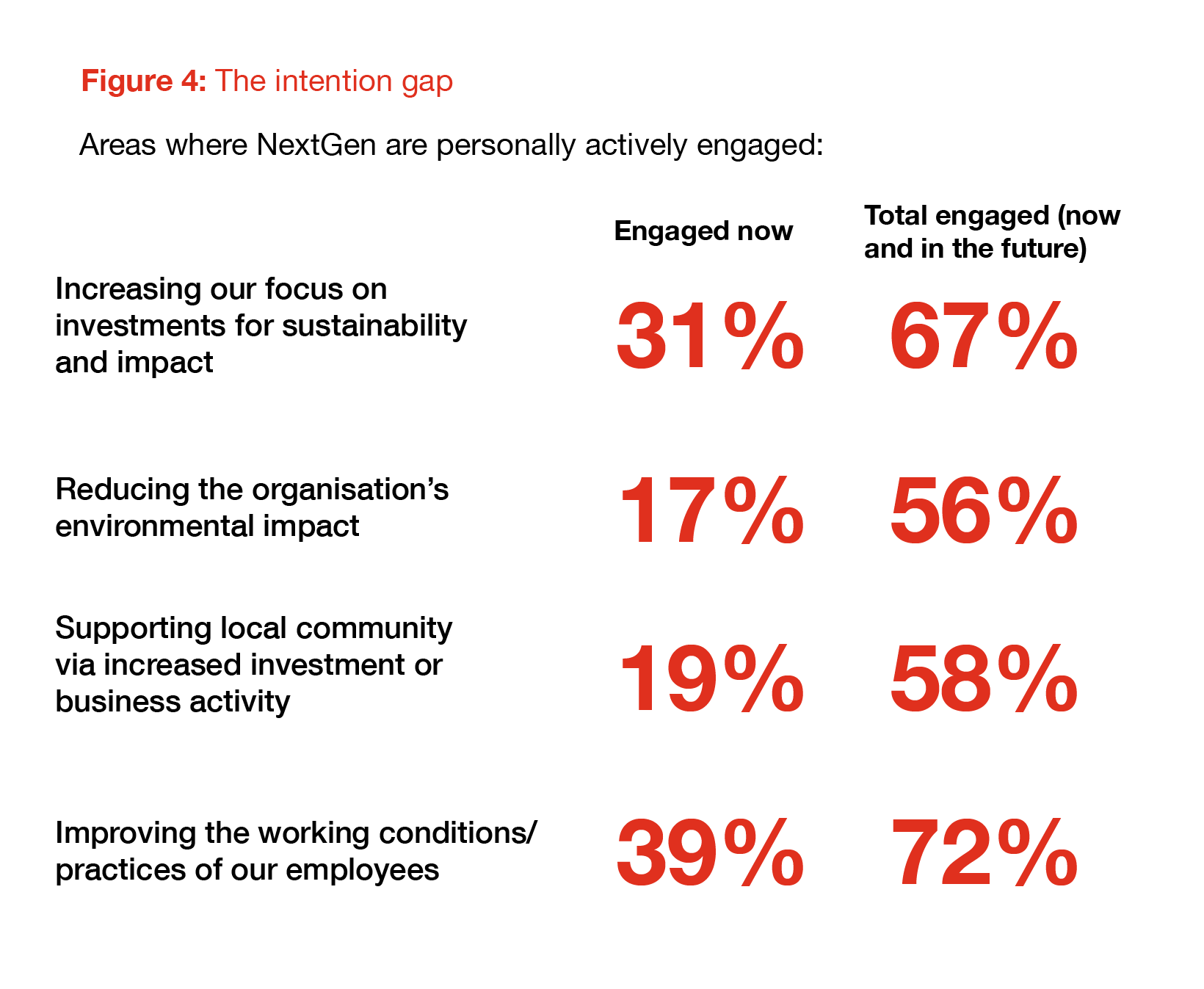

NextGen understands the role that business will play in addressing the world’s challenges, alongside the growing importance of ESG to investors, shareholders, customers, and business partners. A strong ESG strategy is no longer a nice-to-have; it has become a business imperative – research consistently shows that companies that invest in ESG outperform those that don’t. The multinationals that family businesses in the Middle East work so closely with are strengthening their commitment to ESG, propelled by consumer sentiment, and are encouraging their Middle East partners to do the same. NextGen understands that it makes sense to voluntarily strengthen their own ESG policies before it becomes a mandatory requirement.
The next vital stage is to transform NextGen’s ambitions around ESG into reality. Only a fraction of Middle East NextGen family members are actively engaged in ESG issues today, but 67 percent want to be involved in the near. future (figure 4).
NextGen have already proven themselves with their contribution to their family business’s digital and technology strategy. ESG is the next big challenge – and NextGen has the ability and drive to lead family businesses on sustainability.
NextGen in a leadership role
Family businesses in the Middle East trust and rely on NextGen family members to play a leading role in the business. 72 percent of Middle East NextGen say that they are already in a leadership role, compared with just 53 percent of NextGen worldwide.
Bridging the gender gap
Across the world, women are less likely to be in a leadership role in a family business. The survey shows that 43 percent of female NextGen, and 59 percent of male NextGen, are currently in a leadership role.
Overall, 35 percent of female NextGen believe their male counterparts are more likely to be expected to run the business, and this has historically been particularly true in the Middle East. But some family businesses in the region are moving against the trend.
This can bring real benefits in terms of diversity of thinking as our survey shows that male and female NextGens have different priorities. Women are marginally more focused on ESG concerns. Also, improving working conditions and sustainability are higher on their list than their male counterparts.
The pandemic has undoubtedly encouraged more NextGen into roles of responsibility. Almost half of NextGen in the region say that the pandemic accelerated their involvement in the business, and a fifth say that they were asked to lead a specific change project or initiative during the crisis (figure 5). This was most frequently in the areas of talent management, expanding into new markets, or adopting new technology.
As a result, 39 percent of Middle East NextGen feel far more committed to the main family business than they did before the pandemic. 58 percent say that communication about the business between family members improved during the crisis, and a third say that communication between NextGen and the current generation of leaders is stronger than it was before (figure 6). It took a crisis, but communication between family members has never been better – family businesses in the Middle East should make sure that this momentum is maintained in the future.
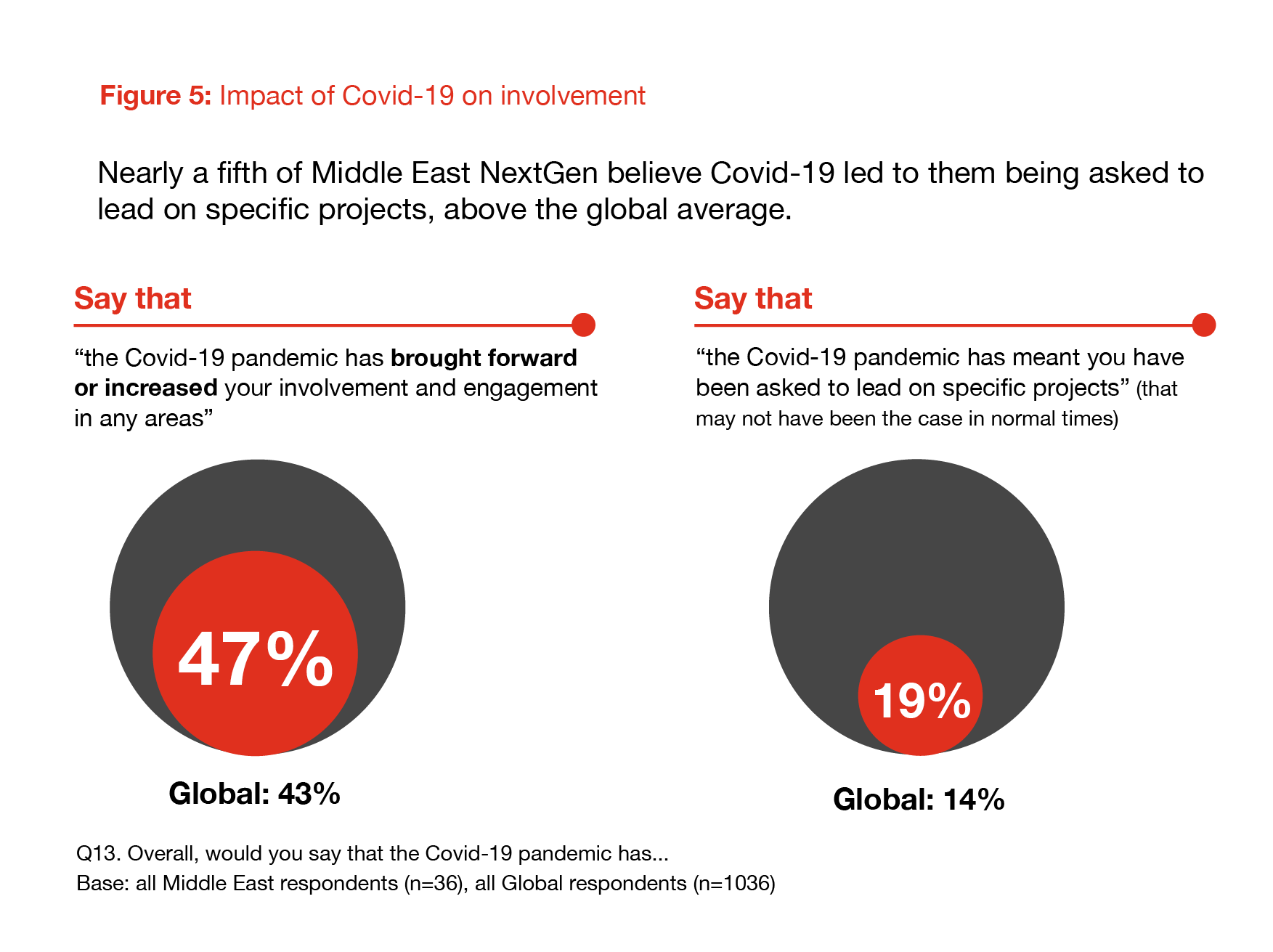


Educating Future Leaders:
At a time when many NextGen in the region have been focused on their own projects, the survey shows a renewed commitment to the family business and a strengthening of the bonds of trust between generations. NextGen feel positive about their value and their contribution to the business. But they are not complacent; more than a third feel that the pandemic highlighted the need for them to improve their skills (figure 7).
All of the NextGen respondents to our survey have at least a university degree or the equivalent (61 percent studied business), and one in five have an MBA. But they know that learning is an ongoing discipline and are keen to develop and broaden their skills even further.
Family businesses will need new perspectives if they are going to take full advantage of all opportunities. Business schools are beginning to recognise this, and many are exploring a more multidisciplinary approach to business and leadership with a far greater emphasis on people, planet, and purpose instead of pure profit maximisation.
Securing the family’s future
The decision to cede control to the next generation is a huge, once-in-a-lifetime decision for the current generation of family businesses. The involvement of NextGen has accelerated as a result of the pandemic and their level of responsibility has increased – they are keen to step up to further challenges but also conscious that the contribution of all generations is essential to the business and the current generation may not yet be thinking about retirement. This is a journey that the family must navigate together, with care; 67 percent of NextGen in the Middle East (compared to 57 percent globally) say that the current generation’s reluctance to let go is one of the most difficult aspects of succession. While NextGen are clearly keen to take on new responsibilities, they are clearly conscious that the current generation are the core of the business and are not yet ready to retire.
Succession is critical for family businesses in the Middle East. 65 percent of Middle East family businesses have NextGen family members working in the business, compared with 55 percent globally. It is vital that these businesses capitalise on the involvement of their younger family members and make sure that training is in place to develop their skills and experience for the future. Equally important is a formal structure for succession, but while a third of NextGen in the region say that the pandemic has accelerated succession, only half of family businesses in the region currently have a formal succession plan in place (figure 8). Clarity around succession and the expectations of each generation are critical in continuing on a growth trajectory.
Succession planning is an area where clear communication is essential. The current generation needs to know that they can leave the business in the hands of family members who are well-prepared. And NextGen needs to see how they will gain the requisite experience, and the milestones they are expected to reach along the way. What being prepared for succession means in practice is rarely articulated and in the absence of that discussion, many NextGen feel that the way to win the confidence of the current generation is to follow their example rather than forge a different path. This might explain why NextGen’s firm conviction that ESG is tied to growth has yet to be translated into action.
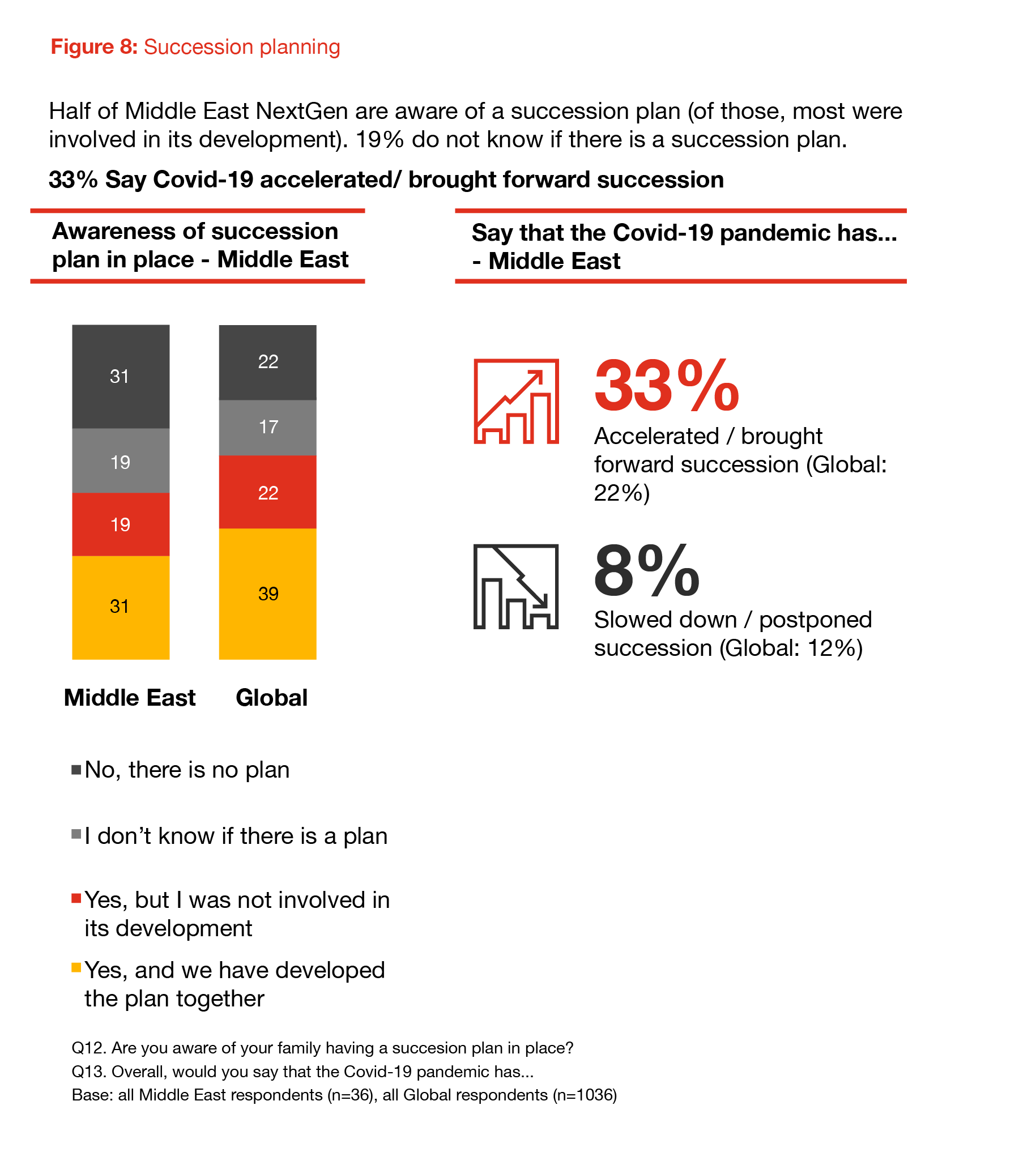
This is why a growing number of family businesses worldwide are turning to a ‘generational contract, which sets out the expectations of both sides. Communication between the generations is stronger in the wake of the pandemic, so this is an opportunity to keep the conversation alive and work out the details: What are the leadership skills and experience required to allow the business to thrive? What experience does NextGen need to gain on the path to leadership?
Future wealth management
Creating the double-digit growth that family businesses need to ensure that the generations are secure in the wealth from the business is a significant challenge in a world gripped by crisis. For many family businesses outside the region, a Family Office to manage the investment element of the business is seen as essential not only in protecting wealth, but in improving governance – overall, 42 percent of respondents said they have a Family Office.
The strong commitment to governance shown by family businesses in the Middle East has, so far, meant that relatively few have a Family Office. However, in 2021, 23 percent said they planned to set up a Family Office within five years, indicating that wealth creation and protection is increasingly top of mind.
Recommendations
Becoming the leader your family and business needs
The world is changing, and the business techniques of the past will no longer be enough. NextGen must earn the right to challenge the status quo and to discover growth opportunities for their family legacy.
If family businesses are to succeed in a very different environment, they need visionary leadership. This is a watershed moment. It is time to reimagine what success means – and NextGen has the foresight to lead the way. You know the path the business must follow; it is up to you to become the leader your business needs. Be yourself. Be different. Drive change.











